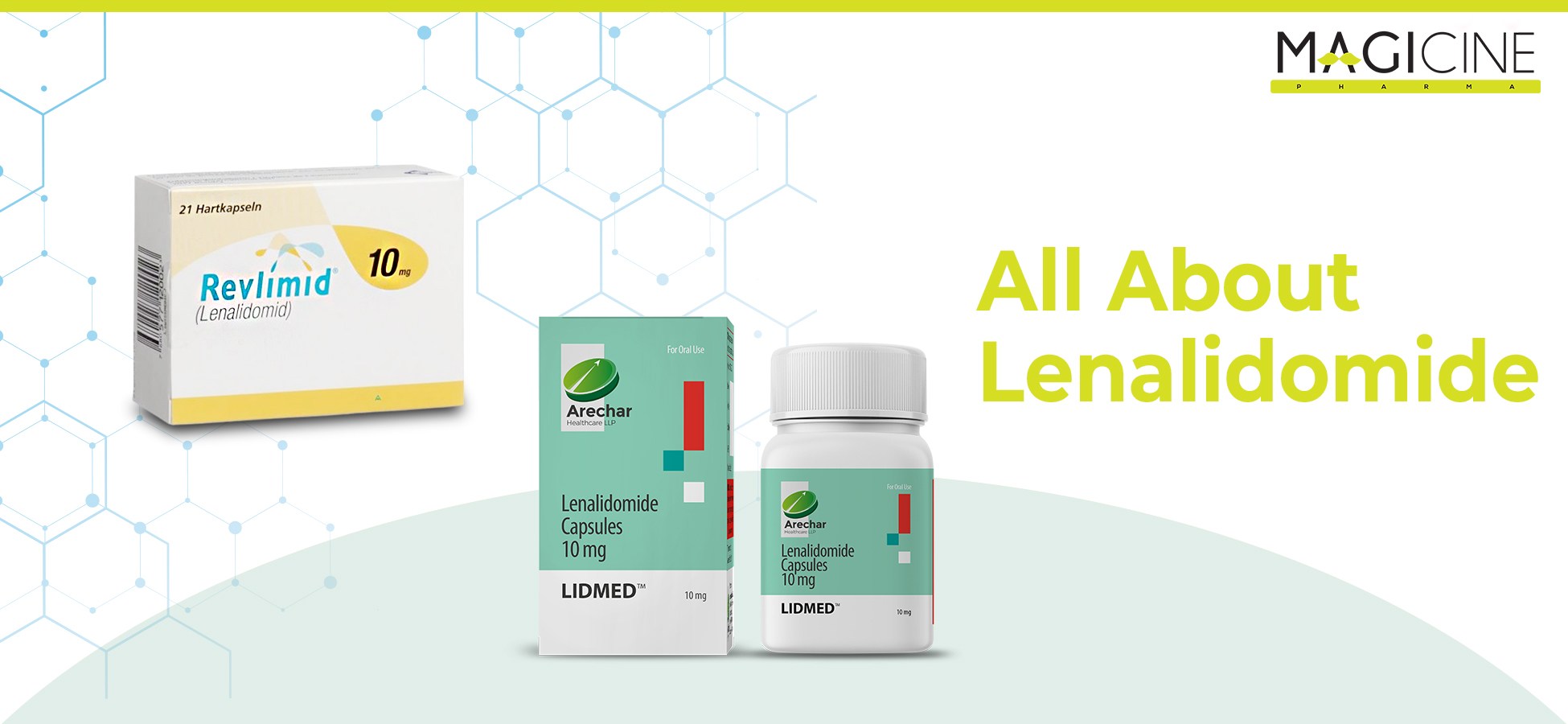
Lenalidomide is a chemotherapy drug approved for the treatment of some types of blood cancers. The medicine is marketed as Revlimid and Lidmed among others. It is indicated to treat and manage multiple myeloma and mantle cell lymphoma. The drug is also prescribed for follicular lymphoma. It is available in the strengths of 10mg and 25mg as capsules.
FDA Approval History:
For Multiple Myeloma: Jun 29, 2006
For Mantle Cell Lymphoma: Jun 5, 2013
For Follicular Lymphoma or Marginal Zone Lymphoma: May 28, 2019
Uses
Lenalidomide is an immunomodulatory drug and an angiogenesis inhibitor that is used in the treatment of patients with:
- Multiple Myeloma (MM), as a component of combination therapy with dexamethasone.
- Multiple Myeloma, as maintenance therapy following autologous hematopoietic stem cell transplantation (auto-HSCT).
- Transfusion-dependent anemia due to Myelodysplastic Syndromes (MDS) that are associated with a deletion 5q cytogenetic abnormality with or without additional cytogenetic abnormalities.
- Mantle Cell Lymphoma (MCL), whose tumor has relapsed or progressed after two prior treatments, one of which included therapy with Bortezomib.
- Follicular Lymphoma (FL), as a component of combination therapy with a Rituximab product.
- Marginal Zone Lymphoma (MZL), as a component of combination therapy with a Rituximab product.
Working
This drug is a thalidomide derivative that works in three steps. The properties it shows include immunomodulation and anti-inflammation.
- STEP-1
Stimulates: By exerting immunomodulatory properties, Lenalidomide activates and increases the number of T cells and NK cells, and inhibits pro-inflammatory cytokines by monocytes. - STEP-2
Strikes: It inhibits cell proliferation by inducing apoptosis of tumor cells. This leads to a significant decrease in tumor burden. - STEP-3
Starves: Angiogenesis is the process in which new blood vessels are formed. Lenalidomide inhibits this process by decreasing the levels of VEGF, TNF-a, and IL-6.
Side Effects
Lenalidomide is expected to show some side effects in hypersensitive patients. Below are some common and rare adverse effects that may occur during the therapy. It is advisable to not ignore any of them (or others) for a long period.
Blood-related issues
- Blood in the stool
- Frequent or easy bruising
- Red or dark-colored urine
- Blood clots
- Anemia
- Coughing up blood
Common side effects
- Chills
- Fever
- Swollen glands
- Cough
- Sore throat
- Vomiting
- Chest discomfort
- Dry mouth
- Irregular heartbeat
- Loss of appetite
- Seizures
- Pale skin
- Lower back pain
- Bleeding gums
Rare side effects
- Blurred vision
- Headache
- Swelling of the face
- Difficulty in breathing
- Sweating
- Clay-colored stools
- Joint stiffness
- Dry hair
- Hair loss
- Difficulty in sleeping
- Hives
- Weight loss
- Sensitivity to heat
Warnings & Precautions
- Pregnancy
In a study among monkeys, the use of Lenalidomide during pregnancy led to limb abnormalities. This drug is not indicated for use in pregnant females. It may cause harm to the fetus. Additionally, experts advise females with childbearing potential to use effective contraception to avoid pregnancy. - Breastfeeding
Since most medicines get excreted into mother’s milk, it may be unsafe to breastfeed during Lenalidomide therapy. Oncologists advise nursing mothers to discontinue breastfeeding until 2 weeks after the last dose. - Hematologic Toxicity
During the treatment with Lenalidomide, some patients may experience symptoms of hematologic toxicity. People suspected of thrombocytopenia or neutropenia must be monitored for related signs. Dose changes may be needed. - Venous Thromboembolism
The use of Lenalidomide may increase the chance of developing deep vein thrombosis. Doctors advise patients to not ignore symptoms like difficulty in breathing or chest discomfort during the therapy period.
Interactions
Interactions with other drugs and diseases may lead to severe events. This is why it’s advisable to make the oncologist aware of the patient’s medical history. Due to some existing conditions, some patients may even require dose changes.
Interaction with medicines: Drugs like durvalumab, cabozantinib, tofacitinib, nivolumab, certolizumab, infliximab, fingolimod, tamoxifen, voclosporin, darbepoetin alfa, and pembrolizumab may interact with Lenalidomide.
Interaction with diseases: Diseases that may show significant interactions with Lenalidomide are as follows. Having any of these conditions calls for a dose modification or therapy discontinuation.
- Renal impairment
- Anemia
- Thromboembolic events
- Severe infections
- Hepatic dysfunction
Interaction with food and alcohol: High-fact meals may interfere with the functioning of the medicine. Contact your doctor to know the potential risks of such foods. Avoid alcohol during the treatment with Lenalidomide.
Overdose
The recommended dose of Lenalidomide (prescribed in combination with dexamethasone) is 25 mg. It is indicated for oral use (once daily). Doctors recommend treatment with lenalidomide till unacceptable toxicity. Patients with other chronic diseases may require dose modifications.
In case of overdose on Lenalidomide, patients may experience symptoms like fainting and chest discomfort. It is advised to seek emergency medical attention to avoid complications. Though there is no set guideline for overdose treatment. Supportive care and monitoring remain the primary treatment procedures.
NOTE: Do not consider this information as a substitute for any valid prescription or doctor’s advice. Consult your doctor to know more about the potential risks and benefits of taking this drug.




